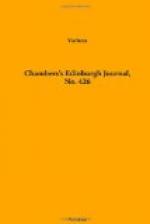With a mind continually on the stretch, and concerned less or more in all the great movements of the day, the features of this remarkable personage ’relaxed into absolute gaiety when in-doors, at table, or in the evening, around the wood-fire in the humble chamber of the cabinet-maker. His evenings were all passed with the family, in talking over the feelings of the day, the plans of the morrow, the conspiracies of the aristocrats, the dangers of the patriots, and the prospects of public felicity after the triumph of the Revolution. Sometimes Robespierre, who was anxious to cultivate the mind of his betrothed, read to the family aloud, and generally from the tragedies of Racine. He seldom went out in the evening; but two or three times a year he escorted Madame Duplay and her daughter to the theatre. On other days, Robespierre retired early to his chamber, lay down, and rose again at night to work. The innumerable discourses he had delivered in the two national assemblies, and to the Jacobins; the articles written for his journal while he had one; the still more numerous manuscripts of speeches which he had prepared, but never delivered; the studied style so remarkable; the indefatigable corrections marked with his pen upon the manuscripts—attest his watchings and his determination.
’His only relaxations were solitary walks in imitation of his model, Jean Jacques Rousseau. His sole companion in these perambulations was his great dog, which slept at his chamber-door, and always followed him when he went out. This colossal animal, well known in the district, was called Brount. Robespierre was much attached to him, and constantly played with him. Occasionally, on a Sunday, all the family left Paris with Robespierre; and the politician, once more the man, amused himself with the mother, the sisters, and the brother of Eleonore in the wood of Versailles or of Issy.’ Strange contradiction! The man who is thus described as so amiable, so gentle, so satisfied with the humble pleasures of an obscure family circle, went forth daily on a self-imposed mission of turbulence and terror. Let us follow him to the scene of his avocations. Living in the Rue St Honore, he might be seen every morning on his way, by one of the narrow streets which led to the rooms of the National Assembly, or Convention, as the legislative body was called after the deposition of Louis XVI. The house so occupied, was situated on a spot now covered by the Rue Rivoli, opposite the gardens of the Tuileries. In connection with it, were several apartments used by committees; and there, by the leading members of the House, the actual business of the nation was for a long time conducted. It was by the part he played in one of these formidable committees, that of ’Public Safety’—more properly, public insecurity—that he becomes chargeable with his manifold crimes. For the commission of these atrocities, however, he held himself to be entirely excused; and how he could possibly entertain any such notion, remains for us to notice.




